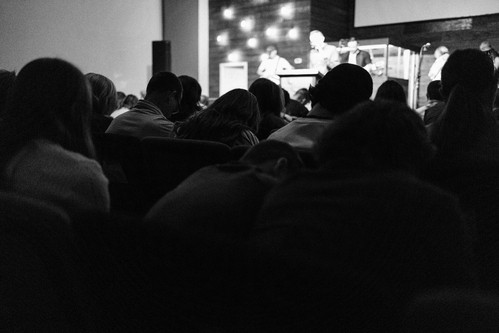April 22nd, 2024
by John Rogers
by John Rogers
The Sons of Korah: Vessels of Mercy
by John Rogers

The following is from Melissa McLaughlin's wonderful article entitled Who were the Sons of Korah in the Bible?1
The events surrounding the sons of Korah, found in Numbers 16 (and Numbers 26:9-11), offer a strong warning and ray of hope. This story involves terrible sin, resulting in fearful consequences. All of which is followed by God’s grace.
As the story begins, Korah and several other Levites, banded together with 250 other men from among God’s people, the Israelites. Korah and his rebellious comrades rose up against Moses and Aaron, claiming they were all capable of leading as priests. However, they primarily rose up against God who had appointed and established Moses as the leader and Aaron as the high priest of the Israelites.
The Lord had already set apart Korah and the other Levites, from among the 12 tribes of Israel. God separated the Levites and brought them near himself to “do the work at the Lord’s tabernacle and to stand before the community and minister to them.”
…
The Levites, descendants of Levi, were assigned holy duties attending to the Tabernacle and all its elements, according to their ancestral lineage. Levi’s three sons were Gershon, Merari, and Kohath. Each of their descendants carried on tasks in the Tabernacle according to their direct family line. Only the descendants of Aaron, however, were appointed to serve as priests.
The Kohathites were responsible for and carried the most sacred objects of the Tabernacle as the community moved from place to place. These objects included the ark, the table, the lamp stand, the altars, the articles of the sanctuary used in ministering, the curtain, and everything related to their use. Since the other Levites cared for objects like the frames, curtains and posts, these less sacred items were moved via carts. However, the Kohathites carried the holy objects, with no carts and no touching. These objects were carefully wrapped before being gripped in their hands and hauled over the miles (Numbers 4:15). Korah was a grandson of Kohath and as his descendant, was among those wielding this heavy responsibility for the community.
However, in this story, Korah’s main demand was that he and the others should be granted the leadership and high priestly duties afforded to Moses and Aaron.
The arrogance of this thought is truly staggering. After Moses and Aaron led the people out of Egypt, through the Red Sea, met with God on Mt. Sinai and then experienced His Presence throughout the wilderness, it had to be evident that the LORD had appointed them to these high positions. For a mere man, after all this, to lift his meager voice against the LORD’s anointed ones, revealed a self-centered pride that defies logic. Who in their right mind would suggest such a thing?
God’s judgment against this overt pride was swift and terrifying.
The Most High God caused the ground beneath Korah and the leaders of the rebellion, to open up, swallow them, then close up once again. Fire then came out from the LORD and consumed the remaining 250 men engaged in this defiance toward God. (Numbers 16:28-33)
Interestingly, just a few chapters later, during a God-ordained census, we read that the sons of Korah were spared from God’s judgment and punishment during this event. (Numbers 26:9-11) God’s mercy prevailed for them.
Scripture does not explicitly state why the sons of Korah were saved…
Perhaps the most telling point about these saved sons of Korah is the way the LORD graciously used them in His service in years to come….
The sons of Korah are credited with writing eleven different Psalms: Psalms 42, 44, 45, 46, 47, 48, 49, 84, 85, 87, 88. These Psalms include verses that express highest praise and devotion to the Lord. While other verses provide images of deep humility and recognition of our frail humanity before a Holy God. Glimpses of their forefathers’ dreadful past seep into some of these verses, as well. Take a look at these excerpts:
Psalm 42:1 – “As a deer pants for flowing streams, so pants my soul for you, O God.”
Psalm 46:1-3 – “God is our refuge and strength, a very present help in trouble. Therefore we will not fear though the earth gives way, though the mountains be moved into the heart of the sea, though its waters roar and foam, though the mountains tremble at its swelling.”
Psalm 47:1 – “Oh, clap your hands, all you peoples! Shout to God with the voice of triumph!”
Psalm 48:1a – “Great is the Lord, and greatly to be praised”
Psalm 49:20 – “Man in his pomp yet without understanding is like the beasts that perish.”
Psalm 84:1, 10 – “How lovely is your dwelling place, O Lord of hosts! For a day in your courts is better than a thousand elsewhere. I would rather be a doorkeeper in the house of my God than dwell in the tents of wickedness.”
…
As it turns out, these insignificant, often unnoticed sons of Korah, with a less than noble ancestry, left for us profound and Godly lessons to learn. Lessons that echo on through the pages of the Bible and into our lives today. God extended mercy to these sons of Korah and their hearts were true to Him.
1 Peter 3:12 – For the eyes of the Lord are on the righteous and his ears are attentive to their prayer, but the face of the Lord is against those who do evil.
1 For the full article, go to: https://melissamclaughlin.org/2020/10/22/who-were-the-sons-of-korah-in-the-bible/
The events surrounding the sons of Korah, found in Numbers 16 (and Numbers 26:9-11), offer a strong warning and ray of hope. This story involves terrible sin, resulting in fearful consequences. All of which is followed by God’s grace.
As the story begins, Korah and several other Levites, banded together with 250 other men from among God’s people, the Israelites. Korah and his rebellious comrades rose up against Moses and Aaron, claiming they were all capable of leading as priests. However, they primarily rose up against God who had appointed and established Moses as the leader and Aaron as the high priest of the Israelites.
The Lord had already set apart Korah and the other Levites, from among the 12 tribes of Israel. God separated the Levites and brought them near himself to “do the work at the Lord’s tabernacle and to stand before the community and minister to them.”
…
The Levites, descendants of Levi, were assigned holy duties attending to the Tabernacle and all its elements, according to their ancestral lineage. Levi’s three sons were Gershon, Merari, and Kohath. Each of their descendants carried on tasks in the Tabernacle according to their direct family line. Only the descendants of Aaron, however, were appointed to serve as priests.
The Kohathites were responsible for and carried the most sacred objects of the Tabernacle as the community moved from place to place. These objects included the ark, the table, the lamp stand, the altars, the articles of the sanctuary used in ministering, the curtain, and everything related to their use. Since the other Levites cared for objects like the frames, curtains and posts, these less sacred items were moved via carts. However, the Kohathites carried the holy objects, with no carts and no touching. These objects were carefully wrapped before being gripped in their hands and hauled over the miles (Numbers 4:15). Korah was a grandson of Kohath and as his descendant, was among those wielding this heavy responsibility for the community.
However, in this story, Korah’s main demand was that he and the others should be granted the leadership and high priestly duties afforded to Moses and Aaron.
The arrogance of this thought is truly staggering. After Moses and Aaron led the people out of Egypt, through the Red Sea, met with God on Mt. Sinai and then experienced His Presence throughout the wilderness, it had to be evident that the LORD had appointed them to these high positions. For a mere man, after all this, to lift his meager voice against the LORD’s anointed ones, revealed a self-centered pride that defies logic. Who in their right mind would suggest such a thing?
God’s judgment against this overt pride was swift and terrifying.
The Most High God caused the ground beneath Korah and the leaders of the rebellion, to open up, swallow them, then close up once again. Fire then came out from the LORD and consumed the remaining 250 men engaged in this defiance toward God. (Numbers 16:28-33)
Interestingly, just a few chapters later, during a God-ordained census, we read that the sons of Korah were spared from God’s judgment and punishment during this event. (Numbers 26:9-11) God’s mercy prevailed for them.
Scripture does not explicitly state why the sons of Korah were saved…
Perhaps the most telling point about these saved sons of Korah is the way the LORD graciously used them in His service in years to come….
The sons of Korah are credited with writing eleven different Psalms: Psalms 42, 44, 45, 46, 47, 48, 49, 84, 85, 87, 88. These Psalms include verses that express highest praise and devotion to the Lord. While other verses provide images of deep humility and recognition of our frail humanity before a Holy God. Glimpses of their forefathers’ dreadful past seep into some of these verses, as well. Take a look at these excerpts:
Psalm 42:1 – “As a deer pants for flowing streams, so pants my soul for you, O God.”
Psalm 46:1-3 – “God is our refuge and strength, a very present help in trouble. Therefore we will not fear though the earth gives way, though the mountains be moved into the heart of the sea, though its waters roar and foam, though the mountains tremble at its swelling.”
Psalm 47:1 – “Oh, clap your hands, all you peoples! Shout to God with the voice of triumph!”
Psalm 48:1a – “Great is the Lord, and greatly to be praised”
Psalm 49:20 – “Man in his pomp yet without understanding is like the beasts that perish.”
Psalm 84:1, 10 – “How lovely is your dwelling place, O Lord of hosts! For a day in your courts is better than a thousand elsewhere. I would rather be a doorkeeper in the house of my God than dwell in the tents of wickedness.”
…
As it turns out, these insignificant, often unnoticed sons of Korah, with a less than noble ancestry, left for us profound and Godly lessons to learn. Lessons that echo on through the pages of the Bible and into our lives today. God extended mercy to these sons of Korah and their hearts were true to Him.
1 Peter 3:12 – For the eyes of the Lord are on the righteous and his ears are attentive to their prayer, but the face of the Lord is against those who do evil.
1 For the full article, go to: https://melissamclaughlin.org/2020/10/22/who-were-the-sons-of-korah-in-the-bible/
More from the blog:
A Radical Christian is an Ordinary Christian
March 2nd, 2026
I grew up in the “Radical” era of Christianity as a teenager. A faithful young man discipled my friends and I by going through David Platt’s book Radical. I love that book and even taught it to youth as a young man. It made me ask the serious question: would I still follow Jesus if I did not have anything? It gave examples of real Christians who had to hide and travel long distances to gather for ...
Love Your Neighbor As Yourself
February 23rd, 2026
The Law of Leviticus boils down to this, and Jesus’ explanation and interpretation of the new covenant also has it at its core: Love your neighbor as yourself. This command in the 19th chapter of Leviticus is cited in three of the four Gospels as Jesus reiterates to the Jews the most important commandment - for it sums up the Law. But what I find interesting is that Jesus doesn’t seem to be tellin...
Finding the Right Foundation for Your Life
February 16th, 2026
Foundations are important. My husband and I discovered this first-hand when we were looking for our first house. The real estate agent took us to a “bargain” fixer-upper property with foundation problems. When we stepped into the house, we quickly saw that the foundation problems were indeed serious. Many of the floors were visibly slanted. Some of the doors were difficult to open. And when I plac...
Sojourners in the Flesh
February 9th, 2026
“This world is not my home, I’m just ‘a passing through.” These words open a lesser known hymn of the early 1900’s, and it seems like the sons of Jacob, and Jacob himself, echo this refrain. As the 70 persons of Jacob’s family come into Egypt, they do so as sojourners. When Pharaoh asks them what their job is, they reply, as instructed by Joseph, “Shepherds.” They go on to say, “We’ve come to sojo...
Suffering is Not Pointless
February 2nd, 2026
18 For I consider that the sufferings of this present time are not worth comparing with the glory that is to be revealed to us. 19 For the creation waits with eager longing for the revealing of the sons of God. 20 For the creation was subjected to futility, not willingly, but because of him who subjected it, in hope 21 that the creation itself will be set free from its bondage to corruption and ob...
Recent
Archive
2026
2025
February
March
April
September
October
November
2024
March
April
September
October
2023
April
May
July



No Comments